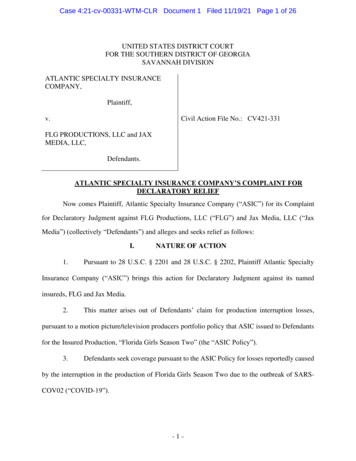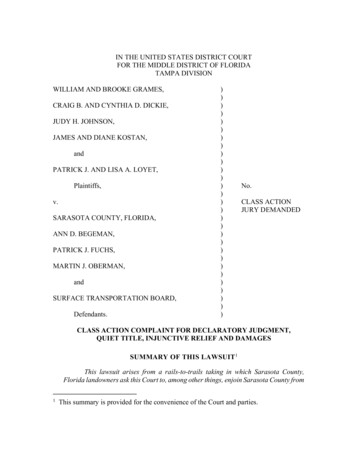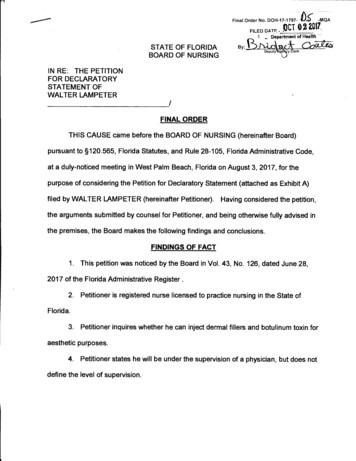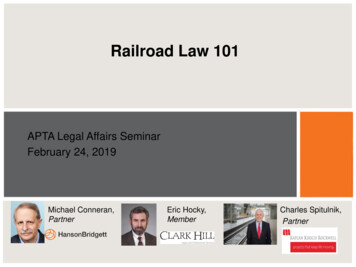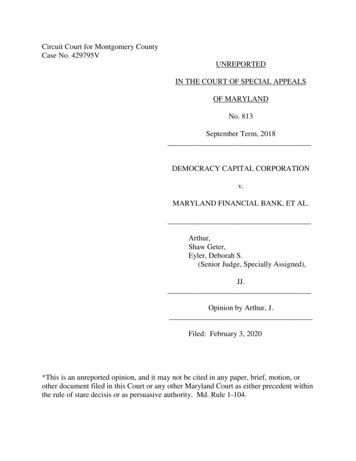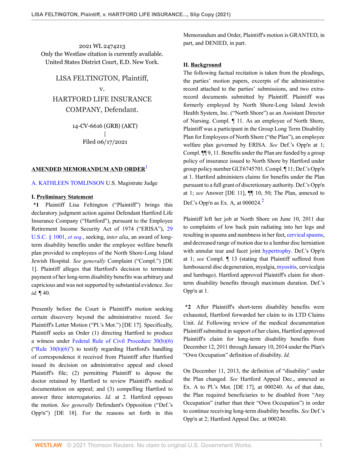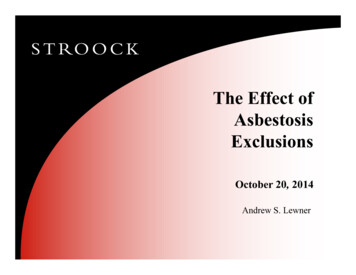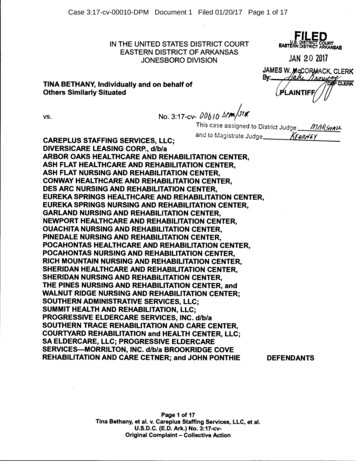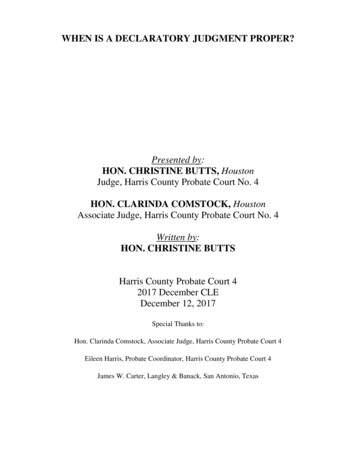
Transcription
WHEN IS A DECLARATORY JUDGMENT PROPER?Presented by:HON. CHRISTINE BUTTS, HoustonJudge, Harris County Probate Court No. 4HON. CLARINDA COMSTOCK, HoustonAssociate Judge, Harris County Probate Court No. 4Written by:HON. CHRISTINE BUTTSHarris County Probate Court 42017 December CLEDecember 12, 2017Special Thanks to:Hon. Clarinda Comstock, Associate Judge, Harris County Probate Court 4Eileen Harris, Probate Coordinator, Harris County Probate Court 4James W. Carter, Langley & Banack, San Antonio, Texas
When Is a Declaratory Judgment Proper?TABLE OF CONTENTSI.INTRODUCTION. . 1II.PURPOSE OF TEXAS UNIFORM DECLARATORY JUDGMENTS ACT. 1A. Remedial Not Coercive Relief. 1B. Subject Matter of Relief under the TUDJA. . 1C. Courts Have Broad Discretion. 1III. ATTORNEY’S FEES IN DECLARATORY JUDGMENTS. . 2A. Flexibility of Court in Awarding Fees. 2B. Award of Attorney’s Fees Discretionary. . 2C. Limitations of Discretion. 21. Reasonableness. . 22. Necessity. 23. Equitable and Just. . 3D. Segregation of Fees. . 3E. Impact on Settlement. . 4IV. COMMON USES OF DECLARATORY JUDGMENTS. . 4A. Will Contests. . 41. Statutory Foundation and Court Interpretations. . 42. Contesting Will Via the TUDJA Generally Permitted. . 6B. Other Declarations Relating to a Trust or Estate. . 61. Construction of Will or Trust. . 62. Resolve Questions Arising During Administration. . 93. Judicial Discharge. 10C. Construction and Validity of Contracts. . 11D. Counterclaim Seeking Affirmative Relief. . 12E. Rival Claims to Same Property. . 13F. Claims Relating to Easement. 13G. Determination Regarding Insurer’s obligations to Insured. . 13V. WHEN USE OF THE TUDJA IS INAPPROPRIATE. . 14A. Case Does Not Involve Actual Controversy. 14B. Case to Alter Rights or Remedies. . 14C. Case to Determine Tort Liability. . 15D. Choice of Law Provisions Prevent Use of TUDJA. . 15E. In Administrative Proceedings When Agency Acting Within Statutory Powers. . 16F. Counterclaim is Mere Denial of Plaintiff’s Claim. 16G. To Interpret Judgments. . 16H. Some Actions Unique to Real Estate. 171. Lis Pendens. . 172. Possessory Rights to Real Estate. . 17VI. CONCLUSION. . 17i
When Is a Declaratory Judgment Proper?446 S.W.3d 823 (Tex. Civ. App.—Fort Worth 2014, pet.denied).Declaratory judgment actions in the United Statesare defined by a statutory framework first developed bythe National Conference of Commissioners on UniformState Laws in 1922 and designed to expand the role andauthority of courts in settling disputes.WHENISADECLARATORYJUDGMENT PROPER?I.INTRODUCTION.Disappointed or would-be beneficiaries and errantfiduciaries fuel the bulk of fiduciary litigation in theprobate courts. Such litigation often involves a: 1) willcontest; 2) will or trust construction question; 3) breachof fiduciary duty claim; and/or 4) petition for judicialdischarge. In addition, litigants strenuously attempt topair causes of action related to breaches of fiduciaryduty and other tort claims with declaratory judgmentactions.Why is this the trend? There are really two primarybenefits to pursuing a declaratory judgment action.First, attorney’s fees which the fact finder finds just andreasonable and the judge determines equitable and justmay be awarded to the parties irrespective of whoprevails so long as the party seeking fees acted in goodfaith. Second, when a declaratory judgment arrives onthe scene, it raises the stakes in the litigation andthreatens to eat away at the possible spoils, occasionallyprompting parties to consider settlement.Since litigants often avoid directly paying thefreight for the prosecution of declaratory judgmentactions, such actions provide an attractive mechanismby which to bring a dispute to the attention of the court.Sometimes, like a wolf in huntsman’s clothing, claimsfor affirmative relief, like seeking the removal of afiduciary, or sounding in tort, like breach of fiduciaryduty, are improperly cloaked as declaratory judgmentactions. This paper will explore common ways in whichdeclaratory judgments are correctly used and examplesof how declaratory judgments are sometimes misused.The Declaratory Judgment aims at abolishingthe rule which limits the work of the courts toa decision which enforces a claim or assessesdamage or determines punishment. TheDeclaratory Judgment allows parties who areuncertain as to their rights and duties, to askfor a final ruling from the court as to the legaleffect of an act before they have progressedwith it to the point where any one has beeninjured.Uniform Declaratory Judgments Act, NationalConference of Commissioners on Uniform State Laws,San Francisco, August 2-8, 1922.B.Subject Matter of Relief under the TUDJA.A person interested under a deed, will, writtencontract, or other writings constituting a contract orwhose rights, status, or other legal relations are affectedby a statute, municipal ordinance, contract, or franchisemay have determined any question of construction orvalidity arising under the instrument, statute, ordinance,contract, or franchise and obtain a declaration of rights,status, or other legal relations thereunder. TEX. CIV.PRAC. & REM. CODE § 37.004(a) (Vernon 2008). Thestatute goes on to state that a “contract may be construedeither before or after there has been a breach.” Id.II. PURPOSEOFTEXASUNIFORMDECLARATORY JUDGMENTS ACT.A. Remedial Not Coercive Relief.The stated purpose of the Texas UniformDeclaratory Judgments Act (“TUDJA” or the “Act”) is“to settle and to afford relief from uncertainty andinsecurity with respect to rights, status, and other legalrelations.” TEX. CIV. PRAC. & REM. CODE § 37.002(b)(Vernon 1986). The statute expressly provides that it is“remedial” and “is to be liberally construed.” Id. Thebasic purpose of the remedy is to provide parties with anearly adjudication of rights before they have sufferedirreparable damage. Harkins v. Crews, 907 S.W.2d 51,56 (Tex. App.—San Antonio 1995, writ denied). TheTUDJA is intended as a speedy and effective remedy forsettling disputes before substantial damages are incurredand was enacted to provide a remedy that is simpler andless harsh than coercive relief, if it appears that adeclaration might terminate the potential controversy.Town of Annetta South v. Seadrift Development, L.P.,C. Courts Have Broad Discretion.A trial court has discretion to enter declaratoryjudgment so long as it will serve a useful purpose or willterminate a controversy between the parties. BonhamState Bank v. Beadle, 907 S.W.2d 465 (Tex.1995). Seealso United Interests, Inc. v. Brewington, Inc., 729S.W.2d 897, 905 (Tex. App.—Houston [14th Dist.]1987, writ ref’d n.r.e.). Though trial courts havediscretion with regard to entering declaratoryjudgments, courts are obligated to declare the rights ofparties when such judgment will terminate theuncertainty or controversy giving rise to the lawsuit.Public Util. Comm’n v. City of Austin, 728 S.W.2d 907,910 (Tex. App.—Austin 1987, writ ref’d n.r.e.).However, the TUDJA does not invite every party to seekconstruction of an instrument, rather, to be entitled torelief under such Act, a party must show that litigationis imminent unless the contractual obligations of theparty can be judicially clarified. Paulsen v. Texas EqualAccess to Justice Found., 23 S.W.3d 42 (Tex. App.—Austin 1999, no pet.).1
When Is a Declaratory Judgment Proper?Chapter 5III. ATTORNEY’S FEES IN DECLARATORYJUDGMENTS.A. Flexibility of Court in Awarding Fees.It has long been recognized that Texas law does notallow recovery of attorney’s fees unless authorized bystatute or contract. Texas follows the “American Rule”whereby parties are ordinarily required to bear their ownattorney’s fees absent explicit statutory authority. SeeTony Gullo Motors I, L.P. v. Chapa, 212 S.W.3d 299,310-11 (Tex. 2006)(citing Buckhannon Bd. and CareHome, Inc. v. West Virginia Dept. of Health and HumanRes., 532 U.S. 598, 602, 121 S. Ct. 1835, 149 L.Ed.2d855 (2001)).Framing a controversy as a declaratory judgmentaction appears advantageous because trial courts mayaward reasonable and necessary attorney’s fees whichare equitable and just, irrespective of whether the partyseeking attorney’s fees prevailed in prosecuting theirclaim. “The trial court may award attorney’s fees to theprevailing party, may decline to award attorney’s fees toeither party, or may award attorney’s fees to the nonprevailing party, regardless of which party soughtdeclaratory judgment.” Brookshire Katy Drainage Dist.v. Lily Gardens, LLC, 333 S.W.3d 301, 313 (Tex.App.—Houston [1st Dist.] 2010, pet filed).1.Reasonableness.Rule 1.04 of the Texas Rules of ProfessionalConduct provides that attorney’s fees must bereasonable. In evaluating whether or not attorney’s feesare reasonable, the following factors are considered:B.See Texas Disciplinary R. Prof’l Conduct 1.04 reprintedin TEX. GOV’T. CODE ANN., tit. 2, subtit. G app. A.Reasonable fees are determined by multiplying thenumber of hours worked by the attorney’s hourly rate.See City of Houston v. Levingston, 221 S.W.3d 204(Tex. App.—Houston [1st Dist.] 2006, no pet). Bothcomponents of the calculation, the hours worked and thehourly rate charged, must be reasonable. Guity v. C.C.I.Enter. Co., 54 S.W.3d 526, 528 (Tex. App.—Houston[1st Dist.] 2001, no pet.). Award of Attorney’s Fees Discretionary.§37.009 of the TEX. CIV. PRAC. & REM. CODEprovides as follows: “In any proceeding under thischapter, the court may award costs and reasonable andnecessary attorney’s fees as are equitable and just.” Thegrant or denial of attorney’s fees in a declaratoryjudgment action lies within the discretion of the trialcourt; a trial court’s judgment on attorney’s fees will notbe reversed absent a clear showing that the trial courtabused its discretion. Oake v. Collin County, 692S.W.2d 454, 455 (Tex. 1985).2.the time and labor required, the novelty anddifficulty of the questions involved, and the skillrequisite to perform the legal service properly;the likelihood, if apparent to the client, that theacceptance of the particular employment willpreclude other employment by the lawyer;the fee customarily charged in the locality forsimilar legal services;the amount involved and the results obtained;the time limitations imposed by the client or by thecircumstances;the nature and length of the professionalrelationship with the client;the experience, reputation, and ability of the lawyeror lawyers performing the services; andwhether the fee is fixed or contingent on resultsobtained and whether there exists uncertaintyregarding collection of the fee before the legalservices have been rendered.Necessity.It seems unusual for an attorney to seek paymentfor unnecessary services and it is rare for courts to findfees unnecessary. Though not a declaratory judgmentaction, the Goodyear case represents an instance wherethe court of appeals found fees to be unnecessary. InGoodyear Dunlop Tires N. Am., Ltd. v. Gamez,defendant Goodyear appealed a portion of the trialcourt’s judgment awarding 400,000 in fees to sixguardians ad litem.This products liability case arose when a highoccupancy van rolled over in Arizona with sixteenmigrant farm workers on board. Six of the passengersdied as a result. Six guardians ad litem were appointedto represent a total of twenty-two minor plaintiffs, withfive guardians ad litem being appointed within onemonth of trial. Shortly before trial, the minor plaintiffsarrived at a settlement, but Goodyear objected to therequested fee of the guardians ad litem on the groundsthat such fees were excessive. Over the objections ofC. Limitations of Discretion.Though the courts enjoy broad discretion withregard to the award of attorney’s fees in declaratoryjudgment actions, as the standard of review is abuse ofdiscretion, there are four limitations to the court’sdiscretion. Attorney’s fees must be: 1) reasonable; 2)necessary; 3) equitable; and 4) just. Whether fees arereasonable and necessary raises a question of fact.Whether fees are equitable and just raises a question oflaw. See Bocquet v. Herring, 972 S.W.2d 19, 20 (Tex.1998) (citing Trevino v. American Nat’l Ins. Co., 140Tex. 500, 168 S.W.2d 656,660 (1943); General MotorsCorp. v. Bloyed, 916 S.W.2d 949, 961 (Tex. 1996); andKnebel v. Capital Nat’l Bank, 518 S.W.2d 795, 799(Tex. 1974)). Further, a court abuses its discretion if itrules arbitrarily, unreasonably, or without regard toguiding legal principals. Id. (citing Goode v. Shoukfeh,943 S.W.2d 441, 446 (Tex. 1997)).2
When Is a Declaratory Judgment Proper?Chapter 5Goodyear, the trial court entered a final judgmentapproving the settlement, dismissing all claims againstGoodyear, and awarding total fees of almost 400,000to the guardians ad litem. See Goodyear Dunlop TiresN. Am., Ltd. v. Gamez, 151 .S.W.3d 574 (Tex. App.—San Antonio 2004, no pet.).Generally, guardians ad litem must represent thebest interests of their client while also serving as anofficer of the court. “The ad litem is required toparticipate in the case to the extent necessary toadequately protect the interests of his ward.” Id. at 580(quoting Am. Gen. Fire & Cas. Co. v. Vandewater, 907S.W.2d 491, 493 (Tex. 1995)). What is more, the role ofthe guardian ad litem ends when the conflict giving riseto such appointment ends; and work performed outsidethe scope of his duties or after the conflict has beenresolved will not be compensated. See BrownsvilleValley Regional Medical Center v. Gamez, 894 S.W.2d753, 755 (Tex. 1995). However, the trial court shallaward the guardian ad litem a reasonable fee to be taxedas costs of court and the appropriateness of such fee isdetermined by factors set out in Rule 1.04 of the TexasDisciplinary Rules of Professional Conduct, includingamong other considerations, the time and labor requiredand the novelty or difficulty of the legal questionsinvolved. Additionally, the appellate court will not setaside an award of guardian ad litem fees without ashowing of abuse of discretion. Goodyear at 580(quoting Boncquet v. Herring, 972 S.W.2d 19, 21 (Tex.1998)).Goodyear complained that, among other things, theguardians ad litem charged for activities outside thescope of their appointment when they prepared for,attended, and reviewed depositions not relevant to theminors to whom the guardians ad litem owed a duty. Inaddition, the guardians ad litem reviewed liabilityrelated pleadings, discovery motions, and depositionnotices.The appeals court in Goodyear ultimately foundthat the guardians ad litem acted beyond the scope ofappointment when they attended or reviewed everydeposition, motion, and pleading without regard to itsrelevance to the minor child to whom they owed a duty.As a consequence, the court determined that the bulk ofthe fees requested were for unnecessary services. Seeid. at 584.In determining whether fees are equitable and just,the judge must consider equitable principles andfairness. “Whether it is equitable and just to award lessthan the fees found by a jury is not a fact questionbecause the determination is not susceptible to directproof but is rather a matter of fairness in light of all thecircumstances.” Burrow v. Arce, 997 S.W.2d 229 (Tex.1999). Though some courts have reversed awards forattorney’s fees as not equitable and just when reversinga declaratory judgment upon which such fees are based,whether the party seeking attorney’s fees prevailed inhis claim is only one of several factors to consider whenanalyzing whether fees are equitable and just. SeeCarpenter v. Carpenter, No. 02–10–00243–CV, 2011WL 5118802, at 8 (Tex. App.—Fort Worth 2011, pet.denied).The court is tasked to use its discretion todetermine whether an award of fees is equitable and just,based upon all the circumstances of the case, not justevidence presented by the party seeking the award. Forexample, the court may consider the history of the case,the value at stake in the litigation, and the merits of aparty’s position.D. Segregation of Fees.Often parties couple declaratory judgment actionswith other actions like breach of fiduciary duty, fraud,or breach of contract. The general rule when pursuingclaims for which attorney’s fees are recoverable withclaims for which such fees are not recoverable is thatfees must be segregated. See Stewart Title Guar. Co. v.Aiello, 941 S.W.2d 68, 73 (Tex. 1997).The exception to the general rule requiringsegregation of fees arises when such claims develop outof the same transaction and are so interrelated that theproof or denial of the claims involves essentially thesame facts. See Gullo Motors, supra at 312 (citing Flint& Assoc. v. Intercontinental Pipe & Steel, Inc. 739S.W.2d 622, 624-25 (Tex. App.—Dallas 1987, writdenied)). The duty to segregate attorney’s fees activateswhen an attorney’s efforts on a case do not also furtherthe cause of the declaratory judgment action. “When thelegal services provided advance both a claim for whichattorney’s fees are recoverable and a claim for whichthey are not recoverable, the claims are so intertwinedthey need not be segregated.” Cooper v. Cochran, 288S.W.3d 522, 537 (Tex. App.—Dallas 2009, no pet.).Courts of appeal have been flooded with claimsthat recoverable and unrecoverable fees are inextricablyintertwined and such courts have applied the exceptionobviating the need to segregate fees differently, as somefocus on the “underlying facts, others on the elementsthat must be proved, and others on some combination ofthe two. Some do not require testimony that claims areintertwined, while others do.” See Gullo Motors, supraat 312.3.Equitable and Just.Though a fact finder finds fees to be reasonable andnecessary, the judge must take the analysis one stepfurther and find a party’s fees to be equitable and just inorder for a party to be awarded attorney’s fees.“Unreasonable fees cannot be awarded, even if the courtbelieve[s] them just, but the court may conclude that itis not equitable or just to award even reasonable andnecessary fees.” Bocquet at 21.3
When Is a Declaratory Judgment Proper?Chapter 5Whether or not a claimant is required to segregatefees is a mixed question of law and fact, as the analysisshould turn on “how hard something was to discover andprove, how strongly it supported particular inferences orconclusions, how much difference it might make to theverdict, and a host of other details that include judgmentand credibility questions about who had to do what andwhat it was worth.” Id. at 313.Though other claims may often be inextricablyintertwined with declaratory judgment actions, someclaims, such as counterclaims unrelated to thedeclaratory judgment action, clearly call for segregationof fees. Attorney’s fees required segregation when adeclaratory judgment action and a counterclaim wereinvolved and defending or advancing the counterclaimdid nothing to advance the declaratory judgment action.See A&L Eng’g & Consulting, Inc. v. Shiloh ApolloPlaza, Inc., 315 S.W.3d 928, 931 (Tex. App.—Dallas2010, no pet.).§352.052 As attorney’s fees escalate, so does theprobability of a pyrrhic victory, where the victor mustpay the attorney’s fees of the vanquished, significantlydepleting the assets of the estate.Consequently, if a will proponent believes theyhold a competitive advantage or have the upper hand,seeking a determination as to the validity of theproponent’s will and contesting the opponent’s willmight properly be brought as a declaratory judgmentaction, thereby enabling such will proponent to possiblyrecover reasonable attorney’s fees from his adversaries,individually, if equitable and just.1.Statutory Foundation and Court Interpretations.The TUDJA provides that, “[a] person interestedunder a deed, will, written contract, or other writingsconstituting a contract . . . may have determined anyquestion of construction or validity arising under theinstrument . . .” TEX. CIV. PRAC. & REM. CODE§37.004(a) (Vernon 1986). The plain language of thestatute seems to allow invoking the Act in a will contestsince the validity of the testamentary instrument is inquestion.However, if heirs at law wish to contest a willsubmitted for probate, and have no competing will tooffer up for probate, framing the contest as a declaratoryjudgement action may be viewed as improper, as thecontest may be a mere denial of the will proponent’sclaim and fail to seek affirmative relief. See discussionsinfra at IV(A)(1)(a) and IV(D). Further cloudinginterpretations of the Act with respect to will contests,the opinions discussed below contain excerpts, whichwhen taken alone, suggest that will contests should notbe pursued as declaratory judgment actions.Practice Tip: Given the varied ways in whichdifferent courts of appeal analyze whetherfees related to the pursuit of a declaratoryjudgment are intertwined with related causesof action, consider segregating fees to theextent possible early on in the litigation.E.Impact on Settlement.Fiduciary litigation involving declaratoryjudgment actions raises the stakes as each party pursuestheir theory of the case. As cases progress, attorney’sfees mount, thereby increasing each party’s risk of lossand eroding the value sought to be obtained withvictory. Yet, as the risk of loss increases and the valuesought to be obtained through pursing the legal actiondeclines, the possibility for settlement also seems todecrease. The possibility of settlement wanes asattorney’s fees escalate, perhaps because the valueavailable for division at the mediation table isdiminished. In that way, the dogged pursuit of eachparty’s position acts like a Chinese finger trap—themore aggressive the conflict, the more difficult itbecomes to cooperatively resolve the dispute.Consequently, when the value sought to be obtainedthrough a declaratory judgment action is fixed, a partyis well advised to make good faith attempts at settlementearly.a.Lipsey v. Lipsey.A frequently sited case, Lipsey v. Lipsey, stands forthe proposition that the validity of an entire will may notbe questioned through a declaratory judgmentproceeding. See Lipsey v. Lipsey, 660 S.W.2d 149 (Tex.App.—Waco 1983, no writ.). In this case, a widow filedan application to probate her deceased husband’s willand the decedent’s son filed a will contest arguing thatthe decedent lacked capacity or was unduly influencedat the time the will was executed. The widow withdrewher application to probate the will and the court nonsuited the application without prejudice.The son appealed the non-suit, arguing that thewidow did not have the right to discontinue the entireproceeding, as the son sought affirmative relief in theform of a declaration that the will was invalid. Theappeals court disagreed and found that the son’s willcontest did not constitute a counterclaim for affirmativerelief and that the widow was entitled to have the entireproceeding dismissed. See id. at 150.In analyzing the Lipsey case, the court of appeals inHarkins v. Crews, 907 S.W.2d 51 (Tex. App.—SanIV. COMMON USES OF DECLARATORYJUDGMENTS.A. Will Contests.When competing wills exist, framing a will contestas a declaratory judgment action expands the number ofpockets from which to recover attorney’s fees. In mostwill contests, the estate of the decedent foots the bill forthe contest provided the parties pursued their actions ingood faith and with just cause. See TEX. EST. CODE4
When Is a Declaratory Judgment Proper?Chapter 5Antonio 1995, writ denied) rightly points out that thebody of the opinion in Lipsey does not address the useof a declaratory judgment action with respect to thevalidity of a will being offered for probate. Rather, theonly mention of the declaratory judgment is within afootnote to the opinion. What is more, once the widowwithdrew her application to probate her deceasedhusband’s will, such will was no longer before the court;and, like the Howard Hughes case discussed below, anyopinion offered by a court with respect to a will notbefore such court is an advisory opinion.had been instituted; so the opinion of the trial court wasnecessarily advisory and impermissible. See Harkins v.Crews, 907 S.W.2d 51 (Tex. App.—San Antonio 1995,writ denied)(supporting the use of declaratoryjudgments in will contests as permissible and furtheringthe public policy of promoting judicial economy).Kausch v. First Wichita Nat’l Bank.Finally, some cite Kausch v. First Wichita Nat’lBank, 470 F. 2d 1068 (5th Cir. 1972) and argue that theTUDJA enables a court to declare only particularprovisions of a will to be invalid, but not the validity ofthe instrument itself. In Kausch, the Fifth Circuit Courtof Appeals analyzed the plain language of the UniformDeclaratory Judgments Act and relevant parts arequoted below:c.Practice Tip: A contest of an application toprobate a will might not seek sufficientaffirmative relief to survive a nonsuit of theoriginal application to probate.b.Howard Hughes Med. Inst. v. Lummis.Another argument used to avoid staging a willcontest as a declaratory judgment action involves aclaim that the Estates Code provides a statutoryframework for proving up a will and allowing the“declaratory judgment mechanism to determine thevalidity of [a] claim that a valid will exists wouldimpermissibly subvert the statutory scheme and timelimitations established by the Probate Code.” HowardHughes Med. Inst. v. Lummis, 596 S.W.2d 171, 173(Tex. Civ. App.—Houston [14th Dist.] 1980, writ ref’dn.r.e.).In the Howard Hughes case, fewer than ten daysafter the death of Hughes on April 5, 1976, the aunt ofHoward Hughes, Annette Lummis, was appointed thetemporary co-administrator of the estate of Hughes byJudge Gregory, the judge of Harris County ProbateCourt 2. Almost a year later, Howard Hughes MedicalInstitute (“HHMI”) entered an appearance in the HarrisCounty probate action and reported that they had filedfor probate an alleged lost will of Howard Hughes in aNevada dist
Home, Inc. v. West Virginia Dept. of Health and Human Res., 532 U.S. 598, 602, 121 S. Ct. 1835, 149 L.Ed.2d 855 (2001)). Framing a controversy as a declaratory judgment action appears advantageous because trial courts may award reasonable and necessary attorneys fees which are equitable and just, irrespective of whether the party
